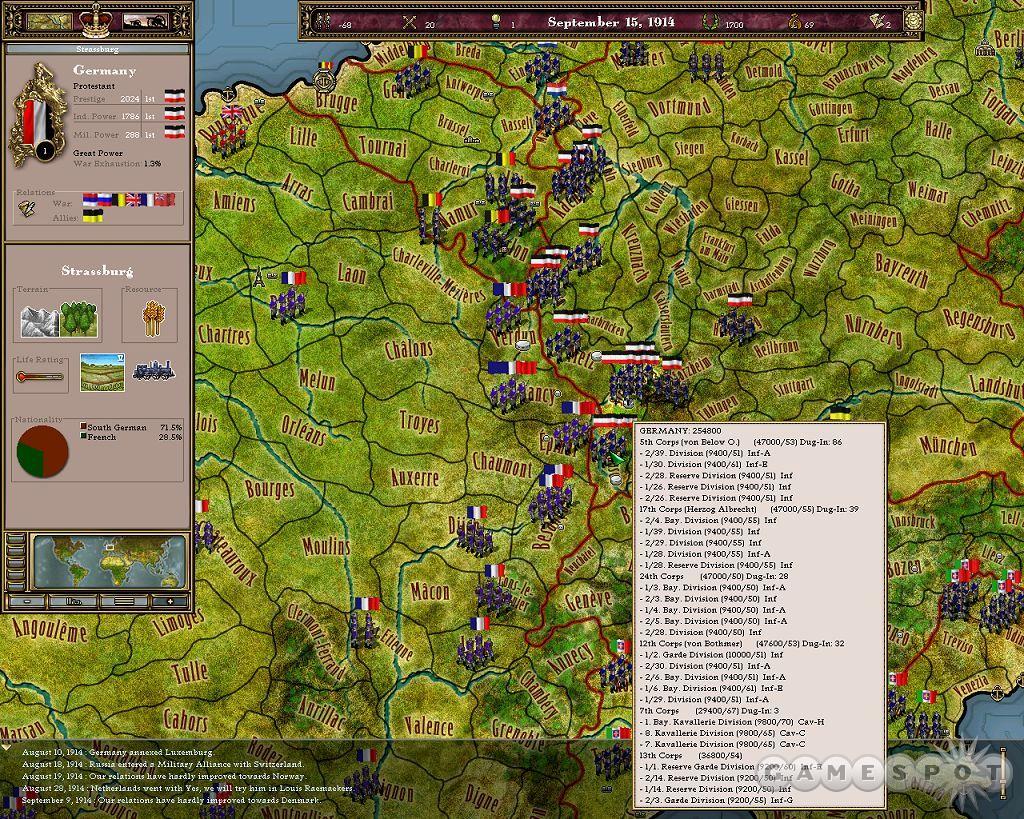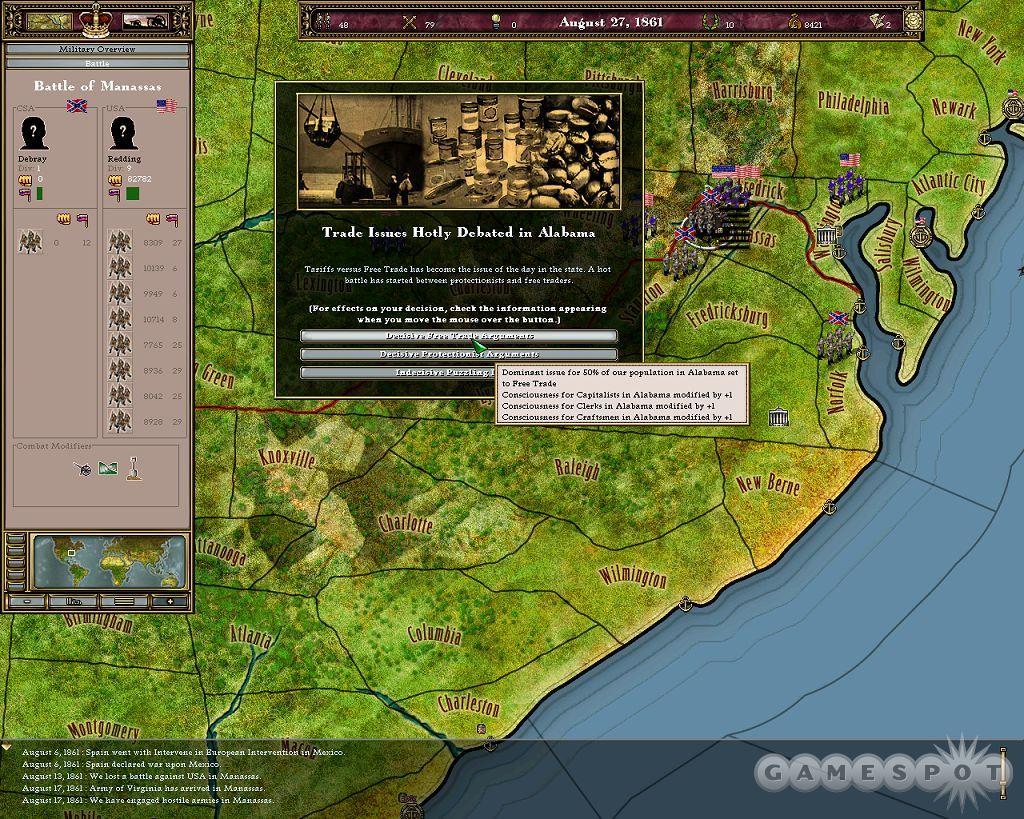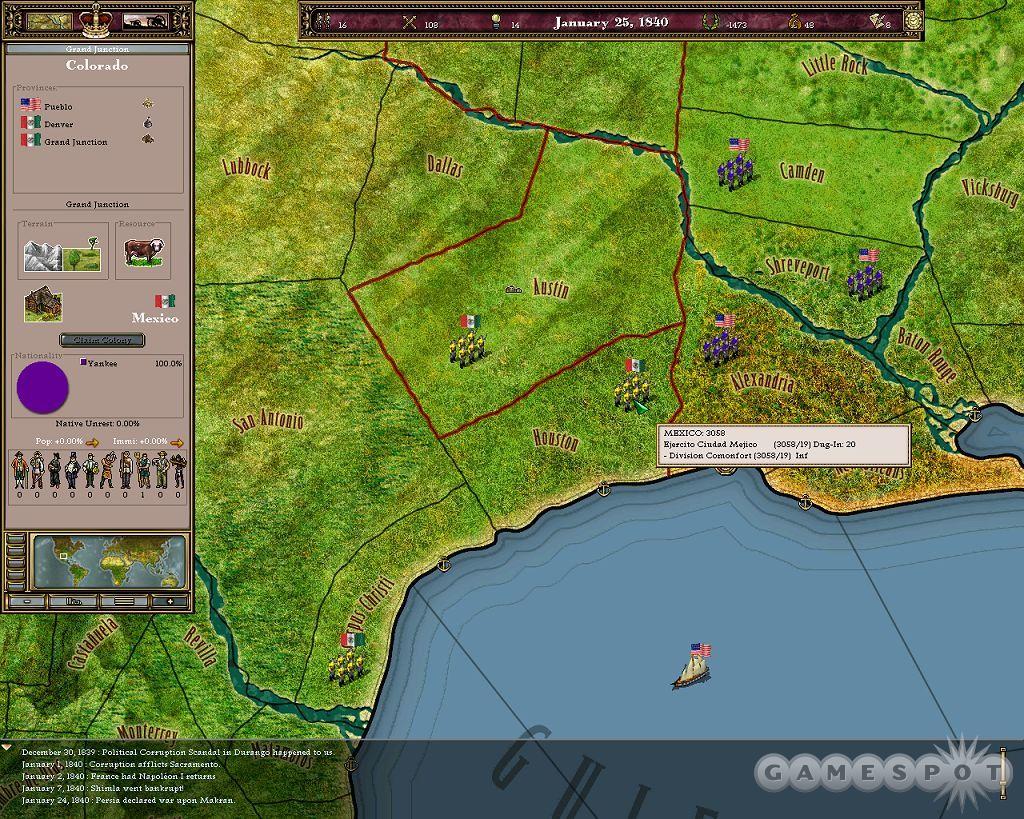Victoria: An Empire Under the Sun opens with a runaway locomotive barreling straight down the tracks toward you. Before it reaches your point of view, however, the scene switches to quick clips of key events in the 19th and early 20th centuries. We see Abraham Lincoln speaking with Union soldiers during the US Civil War, machine guns are being fired, girders are going up in front of a city skyline, bodies are laying in the trenches of WW I, and even Sigmund Freud is contemplating his cigar. All in all, it's an effective and dramatic way to introduce you to the time period represented by this real-time strategic epic from the makers of Europa Universalis.

Unfortunately, this cinematic works both metaphorically and literally. While showing the train and old photographs makes you feel the epochal changes that the world went through during the height of the British Empire, it also gives you a good idea of what you're in for. Victoria is so overwhelming and complex that you might feel as if you'd been hit by that opening-scene locomotive. Despite having nearly a half-dozen voluminous games of historical strategy under its belt, Paradox Entertainment is still tossing people in at the deep end. Add to this some truly spectacular technical problems, and you've got a game that only diehards can appreciate.
Where Paradox's Europa Universalis games provided just enough information to keep you in the loop without quite being overwhelming, Victoria practically tosses a filing cabinet at you. The complexity--exacerbated by the flatly incomprehensible absence of a tutorial, both in the game and in the skimpy manual--is staggering. Every nation that existed on Earth between 1836 and 1920 is depicted here, including nearly 3,000 provinces. You can take charge of any country (from Great Powers like Britain and France to relative trifles like Australia and Canada) in the solo or multiplayer (online or LAN) Grand Campaign, which runs the full 84-year length of the time period. You can also opt to run more limited scenarios, like the one that places you in charge of America at the onset of the US Civil War in 1861 or the one that casts you in the role of Britain's leader in 1881, when she was at her most powerful (added in the 1.01 patch). Budgets are set, elections are held, technologies are researched, provinces are colonized, revolts are suppressed, armies are built, wars are declared, peace treaties are signed, neighbors are annexed, and so on. Everything that factored into the running of a nation during the time when the sun never set on the British Empire represents an important element here.
Not surprisingly, it takes many, many hours to figure out all of this stuff, and even then it's hard to feel like you've got a handle on what's going on. It's simply impossible to play one of the larger countries during one of your early games, since there are too many provinces to track. Even later, once you've developed some familiarity with the gameplay, there is so much micromanagement involved--when running countries like the massive USA or the colony-rich Britain--that it's preferable to play smaller "starters" like Belgium and Sweden. Even then you have to wait for a long time, as you must first build your social and economic infrastructure, get out of debt, and so on, before doing anything else.

The game's main problems are its density and its non-informative interface. The map is clean and attractive (and will probably be very familiar to veterans of the Europa Universalis series). Additionally, the music is stirring. However, most screens are cluttered with pop-ups. Many can be shut down or their functions turned over to the artificial intelligence--although you then feel like too much of the game is running on autopilot. As with Paradox's epic game of World War II strategy Hearts of Iron, there doesn't seem to be a happy medium.
Another problematic issue with Victoria is that a major aspect of the game doesn't work very well. Economics becomes a real issue later in the game. Money isn't properly redistributed--perhaps because of the sheer difficulty of creating a truly organic financial system--which may be because Paradox felt that the intricacies of such a system would bowl players over. At any rate, cash spent on government programs, like those involving crime-fighting and education, doesn't go into the pockets of the 10 population types to then be recirculated back into the economy; it just evaporates. So you need a constant flow of money coming into the nation to pay all of the bills. This is when you cue the world trade market, which has been tweaked so that you can sell goods even if nobody's actually buying them. Because of this, nearly every nation on the planet can build a trade surplus and make loads of cash. By the end of the 19th century, the Great Powers can each amass the equivalent of Scrooge McDuck's money bin.
Additionally, nations can be wildly unbalanced, depending on region. This is a particular problem in the New World, where--if you can provide a relatively stable social situation with sound economic policies--European immigrants will eventually pour in. Your population will increase by leaps and bounds, thus boosting your industry and trade to the point where you can construct massive armies and navies that are powerful enough to conquer much of the globe. You can turn the USA into an absolute monster, which, admittedly, isn't much of a stretch, but even smaller countries like Argentina and Mexico have a shot at greatness once you improve social systems to the point where Europeans see you as a worthwhile place to emigrate.
It may be difficult even to get Victoria running properly. We couldn't even get the game started, initially. On two Windows XP machines, the game installed and booted without a hitch but dropped to the desktop whenever we selected a scenario. The 1.01 patch didn't make a difference. Much experimentation and trolling through the official support forums eventually solved the issue, which apparently involved a conflict between XP and the Bink player that the game uses to play AVI files. Renaming the AVI directory got the game started, though, of course, all cinematics were disabled.
Even after this, the game occasionally--and apparently randomly--crashed to the desktop, sporadically froze while attempting to save or load games, and so on and so forth. Multiplayer doesn't seem to work at all right now, due to lag and freeze-ups (not that there are ever any players on Paradox's Valkyrienet matching service, anyway). Judging by the many bug posts at the Victoria forums, these issues are commonplace.

With all that said, there is still something compelling about Victoria. Paradox makes a historical game like no other developer, so the air of authenticity drives you on in light of the serious flaws, like the ones noted above. Part of this is the allure of creating a believable alternate reality. Because of the economic issues, just about every midrange country can be turned into an absolute powerhouse. We've had games where Argentina became the dominant force in the Western Hemisphere, where Austria conquered most of Europe, and where the Confederate States of America took out Washington and annexed Canada. Since you never quite know where you're going to end up, once you get engrossed in a campaign, it can be difficult to stop playing.
Victoria still remains a difficult game to truly like. The numerous bugs, the obtuse interface--combined with the lack of a tutorial--and the design flaws make it positively unfriendly. Nothing draws you in. Despite some wonderful depth and a great alternate-history ambience, this game is more work than play.